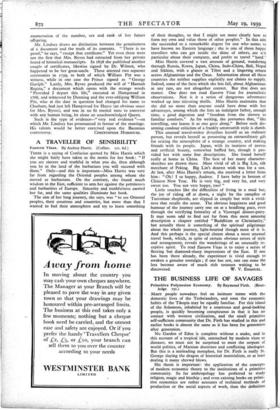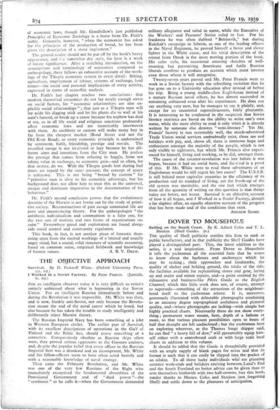THE BUSINESS LIFE OF SAVAGES
MANY people nowadays feel on intimate terms with the domestic lives of the Trobrianders, and soon the economic habits of the Tikopia may be equally familiar. For this island of the Solomons, inhabited by a courteous and good-looking people, is quickly becoming conspicuous in that it has no contact with western civilisation, and the small primitive self-sufficient community that Dr. Firth has studied in this and earlier books is almost the same as it has been for generation after generation.
No Garden of Eden is complete without a snake, and in this account of a tropical isle, untouched by modern vices or diseases, we must not be surprised to meet the serpent of world politics, of Marxian doctrines and conflicting ideologies. But this is a misleading metaphor, for Dr. Firth is really St. George slaying the dragon of historical materialism, or at least dealing it many shrewd blows.
His thesis is important : the application of the concepts of modern economic theory to the institutions of a primitive community. So far anthropology has preferred to study religion, magic and kinship ; and even existing books on primi- tive economics are rather accounts of technical methods of production or the social aspects of work, than the definition
of economic laws, though Mr. Goodfellow's just published Principles of Economic Sociology is a horse from Dr. Firth's stable. Generally, however, "when the economist has asked for the principles of the production of bread, he has been given the description of a stone implement."
The general reader should not be put off by the book's heavy appearance, and t:le somewhat dry style, for here is a work of future significance. After a searching introduction, on the assumptions and terminology of economics compared to anthropology, there follows an exhaustive account of the-work- ings of the Tikopia economic system in every detail: fishing, agriculture, employment of labour, systems of exchange, land tenure—the social and personal implications of every activity, expressed in terms of econoMic analysis.
Dr. Firth's last chapter reaches two conclusions : that modern theoretical economics do not lay nearly enough stress on social factors, for "economic relationships are also ex- plicitly social relationships " ; that just as a Tikopia man will lay aside his digging stick and let his plants die to wail at his aunt's funeral, or break up a canoe because his nephew has died at sea, so in all life social and religious sanctions profoundly affect economic laws and are inextricably interwoven with them. As snobbery or custom will make many buy in far from the cheapest market (Bond Street and not the Old Kent Road), so every economic principle is undermined by sentiment, habit, friendship, prestige and morals. The so-called savage is not irrational or lazy because he has dif- ferent aims and intentions from the City man. He prefers the prestige that comes from refusing to haggle, from not taking value in exchange, to economic gain—and so often, for that matter, do we. With the Tikopia goods lent during bad times are repaid by the same amount; the concept of usury is unknown. This is not being "bound by custom" for "primitive man is alive to his economic advantage, but his background does not allow him to treat this as the universal, unique and dominant imperative in the determination of his behaviour."
Dr. Firth's second conclusion proves that the evolutionary doctrine of the Marxist is not borne out by the study of primi- tive society. Reconstructions of past savage communal life are pure and unconvincing theory. For the anthropologist "the antithesis individualism and communism is a false one, for the two sets of motives and two forms of organisations co- exist." Everywhere greed and exploitation are found along- side social control and community regulation.
This book, in fact, is not another piece of fantastic theo- rising spun from the excited workings of a limited and usually angry mind, but a sound, solid structure of scientific reasoning, based on common sense, empirical fieldwork and knowledge



















































 Previous page
Previous page